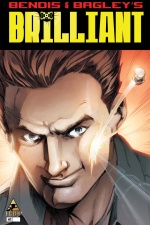February marks ten years of this blog's existence. Unfortunately, I won't be able to sustain it for much longer. Computers cost money, which is in short supply right now. And my present machine is in desperate need of repairs I can't afford. So I don't know how long before I can get things sorted out. This could be the occasion where I decide it's just not worth the effort to carry on. But let's get on with this month's news before I go, for now.
DMG Entertainment has purchased Valiant. Strangely, I can't seem to care given the publisher's relatively small profile.
Forbes has an article on longtime Marvel scribe Brian Michael Bendis and his move to DC, a deal which also includes the transfer of his creator-owned titles to the new publisher.
"It just so happened I was back in Cleveland for the first time in years for my brother's wedding, when the offer was put forth [by DC]. I went to visit my friend John [Skrtic] who runs the Cleveland public library — we grew up together — and he had a Superman exhibition. And I walked in there and it was like the universe was speaking to me, telling me 'Oh you've got to do this!' And it flooded back to me in the biggest way possible, and here we are." ...
"Number one, DC is going to be hosting Jinxworld as a whole," he said, "so everything I've ever done in the creator-owned world will be coming to DC. And on top of that, we’ll be debuting brand new material, brand new series that I think will be exciting for the marketplace and for fans, stuff I haven't tried before and stuff people have been begging us for. We'll be debuting that all this year."
"And number two," Bendis continued, "separate from Jinxworld, is that I will be hosting and curating an imprint, a custom imprint not unlike what Gerard Way is doing with [DC imprint] Young Animal. It's going to be a select series of special comics, and we'll debut what those are later in the year. I'll be writing some of those and curating the others, but they'll all be under this imprint and add a very special flavor to the DC Universe. I'm happy to say it will star some of my all-time favorite DC characters in unique situations, and that I could not be more excited for."Jules Feiffer profiled by Michael Cavna.
The Dora Milaje, from Black Panther (2018).
As the latest entry from a Marvel Cinematic Universe currently celebrating its first decade, Black Panther is more than just a superhero film. Its impressive box office numbers have shattered Hollywood conventional wisdom that blockbusters staring people of color can't succeed financially.
But as the first film in a successful franchise fronted by a powerful black man and a phalanx of formidable and inspiring women, Black Panther came in with higher expectations than simply making back its expenses. And in this regard, it also succeeded. The MCU has dealt with politics before, notably with terrorism and imperialism. However, politics is at the heart of this film. Black Panther tackles an array of issues with surprising poignancy: Pan Africanism, the African diaspora, slavery, racism, isolationism, Afrofuturism, even as it leans hard into Stan Lee's and Jack Kirby's goofy sci-fi ideas. This results in a film where the primary antagonist Erik Killmonger isn't your standard world-conquering villain, but a revolutionary backed by justifiable grievances, even as his toxic masculinity obviously undermines the very legitimacy of his extremist methods. Given that Wakanda, a fictional nation possessing the most advanced technology in the world, chose self-imposed isolation when it had the power to stop the colonization and enslavement of Africa at its very inception, he has a point.
Black Panther's emotional impact is reminiscent of last year's Wonder Woman in its presentation of an empowering tale when the communities it addresses are under renewed assault from longstanding reactionary forces. But as befits an MCU film, the final product is funnier and more generous.
An interview with Reginald Hudlin.
Evan Narcisse recommends 30 Comics You Should Read for Black History Month (including Black Panther).
Abraham Reisman on Don McGregor's run on Black Panther.
Tucker Stone and David Brothers on McGregor's classic Black Panther arc "Panther's Rage".
James Whitbrook lists Black Panther's most memorable comic book moments. But including the annulment of his marriage of Storm? That's cold.
Abraham Reisman recommends 5 Black Panther Comics to Read.
Tegan O'Niel explains how Green Arrow became a jerk.
Heidi MacDonald praises the top 20 selling graphic novels of 2017 for its diversity.
DC unveils new imprints aimed at younger readers.
A guide to the work of the late Ursula K. Le Guin. Neil Gaiman payed tribute to her during the 2014 National Book Awards. The rest of the literary world reacts to her passing.
A profile on the late Marc Campos on TCJ.
RIP Mort Walker (September 3, 1923 – January 27, 2018), best known as the creator of Beetle Bailey.









